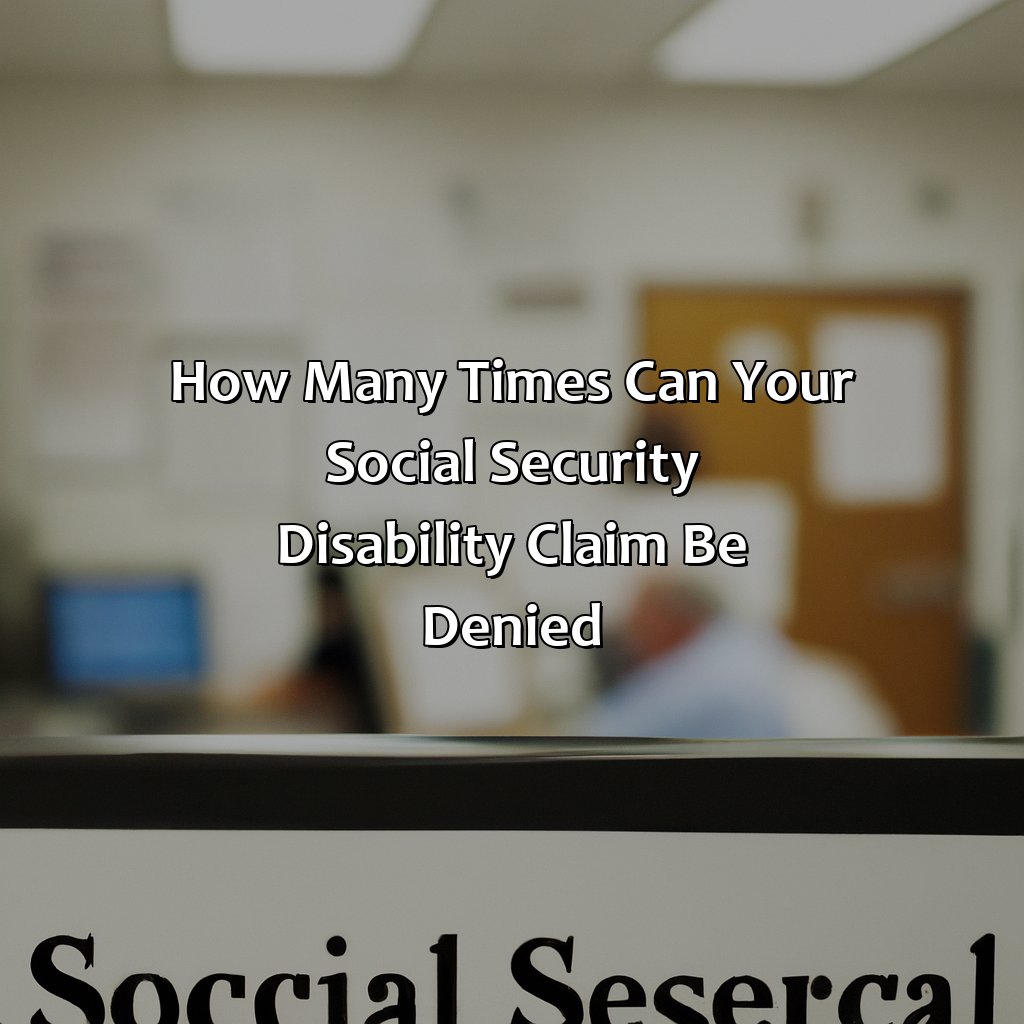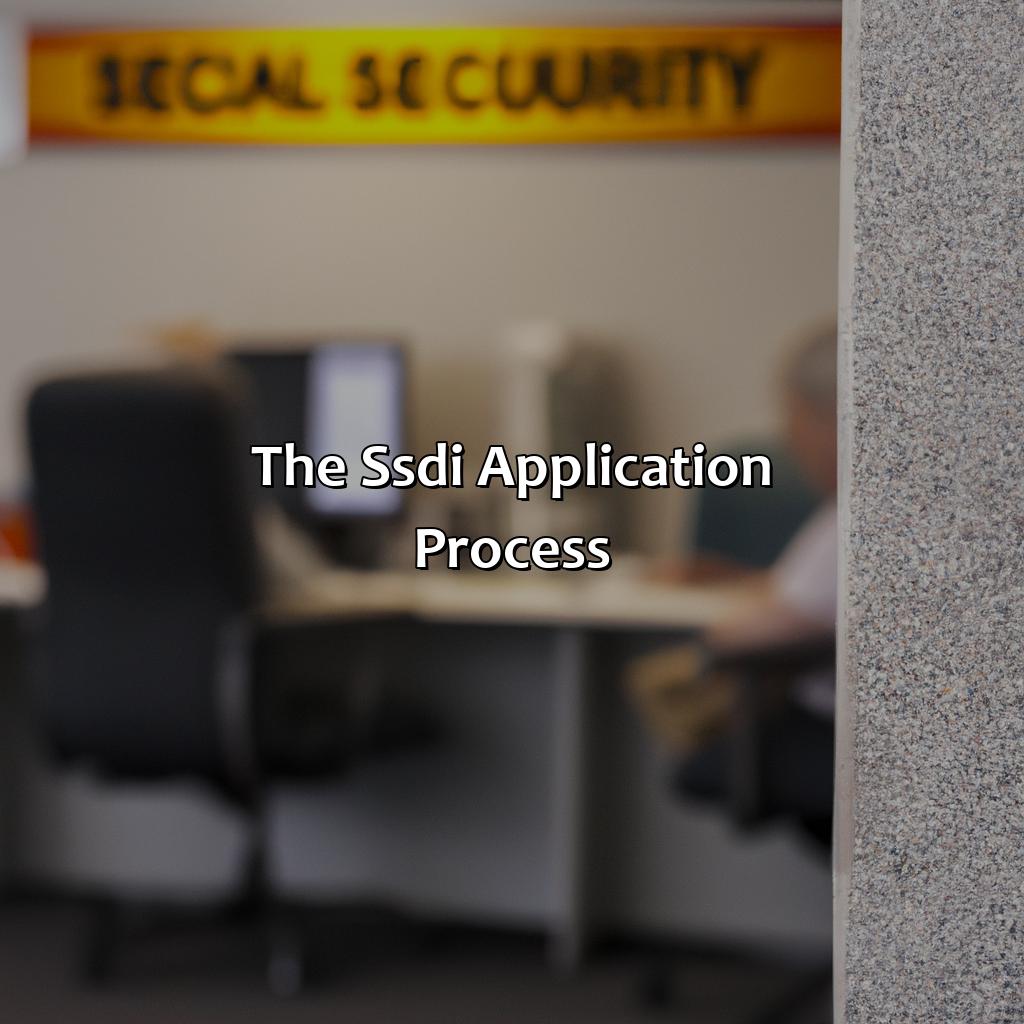How Many Times Can You Be Denied Social Security Disability?
Key Takeaway:
- Your Social Security Disability claim may be denied multiple times, but there is no limit to the number of times you can apply for benefits.
- The appeal process allows you to challenge a denial and request a reconsideration, hearing, or review by the Appeals Council or federal court.
If you are struggling with a disability and are applying for Social Security Disability benefits, you may be wondering how many times you can be denied. This article will help you understand the process and provide helpful guidance. You will gain the knowledge and confidence to take the necessary steps to ensure your application is successful.
How many times can your Social Security Disability claim be denied?
Max the number of times your Social Security Disability (SSDI) claim can be denied? Know it! And also, reasons why your claim may not be approved. Plus, steps to appeal the decision. And finally, re-filing a claim – options for that too. Get them all here!

Image credits: retiregenz.com by Yuval Jones
Reasons for denial of SSDI claim
A Social Security Disability claim can be denied for various reasons, such as lack of medical evidence, failure to follow prescribed treatment, and being able to perform other types of work. Additionally, if the applicant earns more than a certain amount or does not have enough work credits, they may not qualify for benefits.
It is essential to note that even after being denied once, an applicant can file another application that covers a different timeframe or provides new medical evidence. However, the process could take longer and may require a hearing before an Administrative Law Judge. Thus, it is crucial to know the eligibility criteria and have proper documentation before applying.
While social security disability benefits can be challenging to qualify for, it is worth understanding all aspects of the process to avoid missing out on potential support. Seeking legal counsel or reaching out to social security administration representatives can increase the chances of getting approved for benefits.
If at first you don’t succeed with your Social Security Disability claim, just remember – the appeal process is like a game of Chutes and Ladders, but with more paperwork and less fun.
Appeal process
The social security disability appeal process allows claimants to request a review of their denied application. The appeal can go through several stages, including reconsideration, hearing, and appeals council review. Each stage offers an opportunity to provide further evidence in support of the claim. The process may take time, but persistence and presenting new evidence could potentially lead to an approval.
It’s important to note that the appeal process is not a guarantee for approval. It can be done multiple times, but each denial will require stronger evidence to support the claim. Consulting with an experienced attorney or representative who specializes in this area could increase your chances of success.
In addition to providing medical evidence, other factors like work history and age could impact the decision-making process by administrative law judges.
One real-life example involves a man who was denied social security disability three times before finally being approved at the hearing level. He struggled with bipolar disorder for years and amassed substantial evidence supporting his case during subsequent appeals.
Re-filing a SSDI claim is like the movie Groundhog Day, except instead of reliving the same day, you’re reliving the same bureaucratic nightmare.
Re-filing a SSDI claim
Submitting multiple Social Security Disability Insurance (SSDI) claims may be necessary if the previous ones have been denied. It is possible to resubmit a claim, but you must provide new and relevant evidence that wasn’t included in your previous applications. This ensures that your claim will be reviewed again, giving you another chance at approval.
The SSA allows individuals to file new disability claims even after they have been denied benefits in the past. However, if your SSDI benefits application has already received a final decision from an Administrative Law Judge (ALJ), you won’t be able to file a new application for the same condition unless there are significant changes in your medical or work status. These changes must support the likelihood of approval of a future claim.
It is essential to note that every denial may make it harder to get approved for SSDI benefits as most cases pile up into considerable proof of inadequacy in prior claims. It is crucial to ensure that every application process includes all necessary documents and requirements needed by the SSA.
An individual named Jenny was diagnosed with lupus SLE and anxiety and depression disorders but had many denials from the SSA as her doctor’s notes were not enough. Later she added statements from her therapist and psychologist indicating the severity of her mental disorder along with lab results showing her struggling immune system, which led to an ultimate approval decision.
Navigating the SSDI application process is like a maze, except the only way out is through a mountain of paperwork and denial letters.
The SSDI application process
We’ll discuss SSDI eligibility criteria, filing a claim, and figuring out the disability onset date. These sub-sections will guide you through the process and help you succeed. Get ready to understand the SSDI application process!

Image credits: retiregenz.com by James Duncun
Eligibility criteria for SSDI
To be eligible for SSDI, an individual must have worked and paid Social Security taxes. Additionally, the individual must have a qualifying disability that prevents them from working for at least 12 months or is expected to result in death.
The severity and duration of the disabling condition are crucial factors. A disabling condition must meet the criteria for one of Social Security’s listed impairments or be equal in severity to a listed impairment. The SSA will also evaluate a person’s ability to perform any type of work-related tasks given their education, age, and past work experience.
It’s important to note that meeting SSDI eligibility criteria can be challenging, and many applicants are initially denied benefits. However, it’s advised to seek assistance from a qualified Social Security attorney who will ensure all necessary documentation is submitted during the first application process.
SSDI can provide essential financial support to those who need it most. Don’t waste time repeatedly applying! Seek expert guidance during the first application process.
Filing for SSDI is like playing a game of paperwork Tetris, except the blocks are denial letters and the game never seems to end.
Filing a SSDI claim
Applying for SSDI benefits requires a thorough and detailed process that evaluates your eligibility. This involves submitting medical records, work history, and other evidence to the SSA for review. The decision of approval or denial is based on strict criteria and can be influenced by many factors.
To increase your chances of obtaining SSDI benefits, it’s vital to have a good understanding of the application process and ensure all required documentation is provided. In addition, getting a well-prepared legal representative can be beneficial for the success of your claim.
It’s possible to appeal if you’re denied SSDI benefits. However, this also requires significant evidence and may take time to resolve. It’s essential to identify errors or missing documentation in your initial application before appealing.
Pro Tip: Understand that the SSDI claim process can be long and complicated. Getting professional help can streamline the process and increase your chances of winning an appeal if necessary.
Figuring out the disability onset date is like finding a needle in a haystack, except the needle is your ability to work and the haystack is a complicated bureaucratic system.
Determining the disability onset date
Identifying the Start of Disability
Once the application for social security disability has been submitted, it is important to determine when the disability began. The correct onset date is essential in determining how much back pay an applicant may receive and how long they will continue to receive benefits.
The Social Security Administration will look at all evidence presented to determine the onset date, including medical records and statements from the applicant. If there is not enough evidence available, an examination may be ordered to obtain further information.
It is possible that multiple onset dates may be suggested by different pieces of evidence or opinions from medical professionals. The Social Security Administration will use all available information to make a determination of which date is most accurate.
In one instance, a man applied for social security disability due to a heart condition but was denied twice before finally receiving approval on his third attempt. He had difficulty verifying his initial onset date as he had stopped working several months earlier due to other issues unrelated to his heart condition. However, with the help of additional medical evidence and testimony from his cardiologist, he was able to prove when his heart condition became severe enough to prevent him from working.
Maximize your chances of approval by hiring a lawyer, bribing the judge, or begging on your knees – whichever works for you.
Steps to increase your chances of approval
Raise your chances of being accepted for social security disability. Follow the above title and focus on these steps:
- Collect all medical details.
- Get assistance from a knowledgeable SSDI attorney.
- Accurately fill out the SSDI forms.
These steps can help you create a persuasive case for your disability claim and enhance your prospects of receiving the rewards you deserve.

Image credits: retiregenz.com by Joel Duncun
Gathering complete medical evidence
To strengthen your application for Social Security Disability benefits, acquiring a comprehensive medical record is crucial. It involves collecting detailed documentation, showcasing the severity of your condition and identification of its impact on your functional capacity. By having complete medical evidence, it will support you in acquiring SSD faster as it provides the Administration with valid proof that validates the legitimacy of your claim.
A supporting medical record needs to be comprised of legitimate and thorough information from all treating sources such as physicians, hospitals records of consultations, laboratory tests, mental health assessments or occupational therapy reports. The documentation should display an ongoing pattern of therapeutic treatment and outlines how your ailment negatively affects your daily life.
Ensure that all essential medical paperwork is readily available at the time you are requesting disability benefits for assessment. This includes copies of x-rays, MRIs or any other imaging procedures performed recently relevant to the condition. Ensure prompt attendance to all physician appointments also prepare yoаurself beforehand so that you can create useful dialogues with practitioners who are treating you currently.
A client once revealed that despite being denied twice for SSD previously, she managed to accumulate full clinical evidence highlighting recent surgeries related to her thyroid cancer treatment as well as harsh chemotherapy sessions which caused physical imbalances – leading her towards anxieties and severe fatigue regularly before getting approved on her third application attempt by working with a reliable SSD attorney specializing in chronic ailments such as herself.
Find a SSDI lawyer who knows the system better than a politician knows how to dodge a question.
Working with a qualified SSDI lawyer
Collaborating with an experienced SSDI representative is crucial for a successful disability benefits request. A knowledgeable lawyer can assist you throughout the application procedure, verifying that all necessary forms have been completed effectively and that you have added all the medical documentation required for your disability.
A qualified SSDI lawyer should analyze your claim and decide how to proceed to receive the greatest chance of acceptance. They will also represent you if your request is denied, and guide you through that appeal. With their experience, they can gather all the necessary details from doctors, case workers, and other experts.
Besides working with a skilled SSDI attorney, keep in mind that following up on paperwork in a timely fashion is essential. Responding promptly to requests for additional information or completing tasks requirements on time will speed up your claims process.
Additionally, be honest in your applications process when describing your impairment rather than exaggerating it or making false statements about your abilities.
By employing expert guidance via an experienced SSDI Lawyer instead of navigating by yourself through this difficult procedure – any legal issues or roadblocks can be swiftly alleviated – ensuring success in obtaining benefits as quickly and efficiently as possible.
Filling out the SSDI application correctly
Submitting an accurate and complete SSDI application is one of the first steps towards achieving success. Ensuring that the application contains all necessary information, including medical records and work history, can increase your chances of acceptance. Here are some useful tips:
- Provide clear and concise information about your disability and how it prevents you from working.
- Include strong supporting documentation from medical professionals that detail the extent of your condition.
- Ensure all work history is accounted for to avoid discrepancies with Social Security records.
- List out current medication and other relevant treatments received for your disability.
- Avoid exaggerating or downplaying symptoms in the application. Be factual throughout.
It’s essential to ask someone familiar with SSDI regulations or a disability attorney if there are any unique considerations that need to be mentioned in your application.
Applicants need to understand that SSDI can be denied multiple times, even without fault on their application. According to Bankrate.com, about two-thirds of initial SSDI applications are rejected, so it’s crucial not to give up hope.
Remember: filling out the application properly is a good start towards acceptance, but applicants must remain persistent despite potential setbacks.
Five Facts About How Many Times You Can Be Denied Social Security Disability:
- ✅ There is no limit to how many times you can apply for social security disability. (Source: Disability Benefits Center)
- ✅ Most people are denied social security disability on their first application. (Source: Social Security Administration)
- ✅ Appeals can be made if you are denied social security disability. (Source: Disability Benefits Help)
- ✅ The appeals process can take several months to several years. (Source: Disability Secrets)
- ✅ Getting a disability lawyer to help with the appeals process can increase your chances of success. (Source: NOLO)
FAQs about How Many Times Can You Be Denied Social Security Disability?
How many times can you be denied social security disability?
There is no limit on the number of times you can be denied social security disability benefits.
What are some common reasons for being denied social security disability benefits?
Some common reasons for being denied social security disability benefits include insufficient medical evidence, failure to meet the eligibility criteria, and earning too much income.
Can you appeal a denied social security disability claim?
Yes, you can appeal a denied social security disability claim. You have 60 days from the date of the denial letter to file an appeal.
What is the process for appealing a denied social security disability claim?
The process for appealing a denied social security disability claim involves filing a Request for Reconsideration and providing additional evidence to support your claim. If the reconsideration is also denied, you can request a hearing before an Administrative Law Judge.
Is it recommended to hire an attorney to help with a social security disability appeal?
Yes, it is recommended to hire an attorney to help with a social security disability appeal. An attorney can help gather necessary evidence, navigate the complex appeals process, and represent you at a hearing.
Can you receive back pay if your social security disability appeal is successful?
Yes, if your social security disability appeal is successful, you may be eligible for back pay from the time you first applied for benefits.
